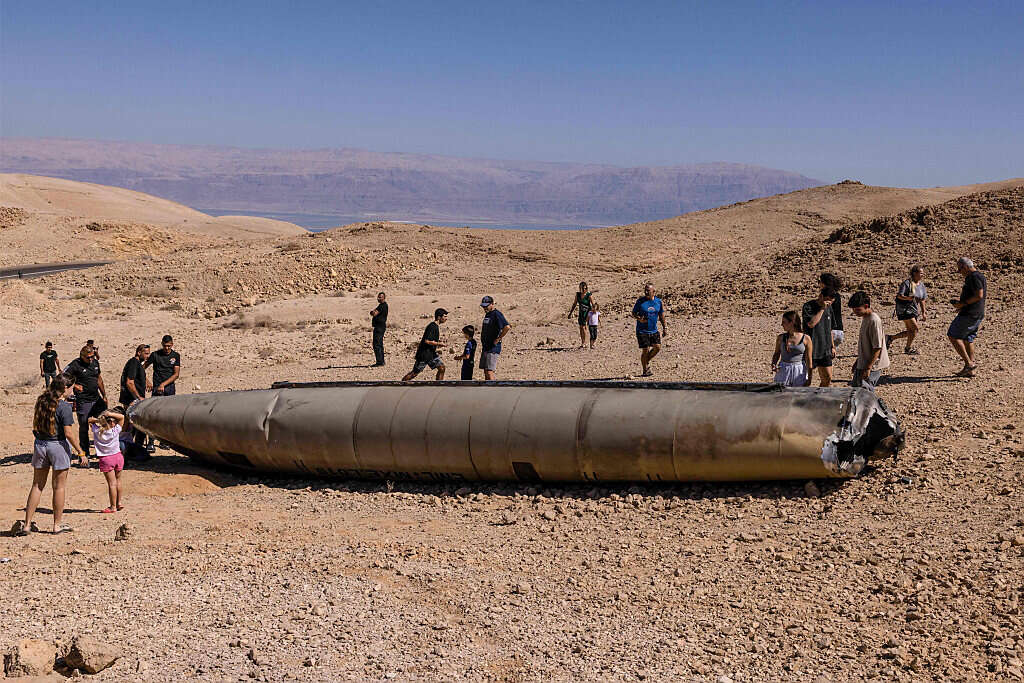When former Israeli Prime Minister Naftali Bennett was asked by ABC's Linsey Davis why he does not support a two-state solution, he answered, "Because they'll kill us." Davis, a bit bemused, seemed to argue that Hamas does not represent "the will of the Palestinian people." When Bennett pointed out that Hamas was in fact elected and chosen by "the people," Davis was stunned and seemed to be searching for the right words with which to respond. What we saw here was a perfect example of the psychological barrier of Western ideology, a consciousness that fails to grasp the depth of a culture that does not accept a Jewish state in its midst.
The past few weeks have seen Hezbollah's middle management decimated, its top leadership eliminated, and Iran's ballistic attack largely thwarted, a result of technological wizardry taken straight from the plot of a fictional thriller. But another incident, headlined in Israel but mostly under the radar internationally, is the real story, and one that brings a sobering truth to the forefront. The truth that ideology, the fuel for behavior, is central to this conflict and central to the existential threats that Israel will continue to face. It is an ideology that Linsey Davis, along with many others, does not yet understand or appreciate.
As Iranian missiles were raining down, two Palestinians armed with machine guns exited a tram in Jaffa, adjacent to Tel Aviv, systematically killing seven civilians, including one young woman clutching a baby to her chest. Despite Israel's massive technological and military superiority, two lone wolves managed to pierce defenses that multi-million-dollar ballistic missiles could not. They likely knew they would not survive their rampage to kill as many Jews as possible, but far from deterring them, it probably raised motivation even higher, presenting them with a prize of "shahada" martyrdom and a place in the hearts of family and community who celebrated rather than mourned their deaths.

To Western minds, this all sounds rather unbelievable, perhaps a figment of a racist approach that fails to acknowledge that we are all alike, that we all want the same things, and that we all just want peace. Some in the West see the lone wolves as victims, exceptions to the rule spurred on by circumstances that we can understand, if not actually justify. It is the same thinking that glorifies "resistance" as legitimate and fails to recognize that internal belief systems are far more responsible for behavior than any external environmental factors. Certainly, "most" Palestinians do not support such attacks, and "surely" most want to live in peace with Israel.
This noble but naive approach, based on wishful magical thinking and fostered by liberal and progressive values, absolves the putative "victim" of any responsibility and assumes that a "fair" solution would solve everything. As with any ideology, this thinking is hard to crack, despite the test of reality. A reality where Palestinian leadership rewards terror, including the lone wolves of Jaffa, with stipends if they survive in prison and subsidies for their families if they are killed. A reality where Palestinians educate children that Jews have no history in the land and have no rights to exist as a state. A reality where, far from being separate from the Palestinian people, Palestinians themselves chose and continue to support Hamas. A reality where Hezbollah, against whom Israel has no territorial claims or aspirations, and Iran, a country with no common border, both seek to eliminate it.
The inability to recognize the defining role of ideology in the culture of the Middle East has incapacitated much of Western thinking and has tilted policy towards solutions that impose Western-based values on a culture that views things very, very differently. Instead of policy shaped according to what the Middle East believes, a generation of Westerners pursue policies consistent with what Westerners believe.
The ideology of the Middle East is no secret. It is preached in mosques, taught in schools, published in newspapers, and disseminated on social media. It is said out loud by leaders of Hamas, Fatah, Hezbollah, and Iran. It is heard in cafes and markets of Ramallah and Nablus and spoken among the Palestinian demonstrators in the West. It is an ideology that has been adopted by the noblesse oblige of academia voiding the legitimacy of Jewish nationhood. While it is there for all to see, the perhaps well-meaning but ultimately distorted "we are all the same" ideology of Western liberals and progressives continues to perpetuate an asymmetry that paints the victim as an aggressor and encourages policies that, rather than promote peace, prolong suffering.
Once ideology moves beyond theory to stand behind strategy and become policy, it moves from hypothetical to real. The ideology of Islamist culture has long ago become a reality that most Israelis have come to recognize as behind the terror they have been facing for decades. We don't know when liberal progressive thinking will recognize that reality as well, but until that switch takes place, real peace between Israelis and Palestinians will remain a pipe dream.
And no technological wizardry can solve that.
Irwin J. (Yitzchak) Mansdorf, PhD., is a clinical psychologist and a fellow at the Jerusalem Center for Security and Foreign Affairs specializing in political psychology.




